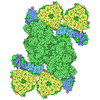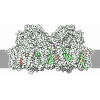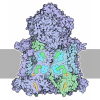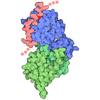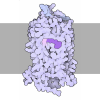[English] 日本語
 Yorodumi
Yorodumi- PDB-6kad: Cryo-EM structure of the C2S2M2L2-type PSII-LHCII supercomplex fr... -
+ Open data
Open data
- Basic information
Basic information
| Entry | Database: PDB / ID: 6kad | |||||||||||||||
|---|---|---|---|---|---|---|---|---|---|---|---|---|---|---|---|---|
| Title | Cryo-EM structure of the C2S2M2L2-type PSII-LHCII supercomplex from Chlamydomonas reihardtii | |||||||||||||||
 Components Components |
| |||||||||||||||
 Keywords Keywords | PHOTOSYNTHESIS / PhotosystemII / supercomplex | |||||||||||||||
| Function / homology |  Function and homology information Function and homology informationthylakoid light-harvesting complex / photosynthesis, light harvesting in photosystem I / photosynthesis, light harvesting / photosystem II oxygen evolving complex / photosystem II assembly / oxygen evolving activity / photosystem II stabilization / photosystem II reaction center / photosystem II / oxidoreductase activity, acting on diphenols and related substances as donors, oxygen as acceptor ...thylakoid light-harvesting complex / photosynthesis, light harvesting in photosystem I / photosynthesis, light harvesting / photosystem II oxygen evolving complex / photosystem II assembly / oxygen evolving activity / photosystem II stabilization / photosystem II reaction center / photosystem II / oxidoreductase activity, acting on diphenols and related substances as donors, oxygen as acceptor / photosynthetic electron transport chain / : / photosystem I / photosystem II / response to herbicide / photosynthetic electron transport in photosystem II / chlorophyll binding / phosphate ion binding / photosynthesis, light reaction / chloroplast thylakoid membrane / response to light stimulus / photosynthesis / electron transfer activity / protein stabilization / iron ion binding / heme binding / metal ion binding Similarity search - Function | |||||||||||||||
| Biological species |  | |||||||||||||||
| Method | ELECTRON MICROSCOPY / single particle reconstruction / cryo EM / Resolution: 3.4 Å | |||||||||||||||
 Authors Authors | Sheng, X. / Watanabe, A. / Li, A.J. / Kim, E. / Song, C. / Murata, K. / Song, D.F. / Minagawa, J. / Liu, Z.F. | |||||||||||||||
| Funding support |  China, China,  Japan, 4items Japan, 4items
| |||||||||||||||
 Citation Citation |  Journal: Nat Plants / Year: 2019 Journal: Nat Plants / Year: 2019Title: Structural insight into light harvesting for photosystem II in green algae. Authors: Xin Sheng / Akimasa Watanabe / Anjie Li / Eunchul Kim / Chihong Song / Kazuyoshi Murata / Danfeng Song / Jun Minagawa / Zhenfeng Liu /   Abstract: Green algae and plants rely on light-harvesting complex II (LHCII) to collect photon energy for oxygenic photosynthesis. In Chlamydomonas reinhardtii, LHCII molecules associate with photosystem II ...Green algae and plants rely on light-harvesting complex II (LHCII) to collect photon energy for oxygenic photosynthesis. In Chlamydomonas reinhardtii, LHCII molecules associate with photosystem II (PSII) to form various supercomplexes, including the CSML type, which is the largest PSII-LHCII supercomplex in algae and plants that is presently known. Here, we report high-resolution cryo-electron microscopy (cryo-EM) maps and structural models of the CSML and CS supercomplexes from C. reinhardtii. The CS supercomplex contains an LhcbM1-LhcbM2/7-LhcbM3 heterotrimer in the strongly associated LHCII, and the LhcbM1 subunit assembles with CP43 through two interfacial galactolipid molecules. The loosely and moderately associated LHCII trimers interact closely with the minor antenna complex CP29 to form an intricate subcomplex bound to CP47 in the CSML supercomplex. A notable direct pathway is established for energy transfer from the loosely associated LHCII to the PSII reaction centre, as well as several indirect routes. Structure-based computational analysis on the excitation energy transfer within the two supercomplexes provides detailed mechanistic insights into the light-harvesting process in green algae. | |||||||||||||||
| History |
|
- Structure visualization
Structure visualization
| Movie |
 Movie viewer Movie viewer |
|---|---|
| Structure viewer | Molecule:  Molmil Molmil Jmol/JSmol Jmol/JSmol |
- Downloads & links
Downloads & links
- Download
Download
| PDBx/mmCIF format |  6kad.cif.gz 6kad.cif.gz | 2.3 MB | Display |  PDBx/mmCIF format PDBx/mmCIF format |
|---|---|---|---|---|
| PDB format |  pdb6kad.ent.gz pdb6kad.ent.gz | Display |  PDB format PDB format | |
| PDBx/mmJSON format |  6kad.json.gz 6kad.json.gz | Tree view |  PDBx/mmJSON format PDBx/mmJSON format | |
| Others |  Other downloads Other downloads |
-Validation report
| Arichive directory |  https://data.pdbj.org/pub/pdb/validation_reports/ka/6kad https://data.pdbj.org/pub/pdb/validation_reports/ka/6kad ftp://data.pdbj.org/pub/pdb/validation_reports/ka/6kad ftp://data.pdbj.org/pub/pdb/validation_reports/ka/6kad | HTTPS FTP |
|---|
-Related structure data
| Related structure data |  9956MC  9955C  6kacC M: map data used to model this data C: citing same article ( |
|---|---|
| Similar structure data |
- Links
Links
- Assembly
Assembly
| Deposited unit | 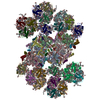
|
|---|---|
| 1 |
|
- Components
Components
-Chlorophyll a-b binding protein, ... , 4 types, 20 molecules 16Y07y235N89pn4GqgSs
| #1: Protein | Mass: 27591.336 Da / Num. of mol.: 6 / Source method: isolated from a natural source / Source: (natural)  #2: Protein | Mass: 27405.008 Da / Num. of mol.: 8 / Source method: isolated from a natural source / Source: (natural)  #3: Protein | Mass: 26675.350 Da / Num. of mol.: 4 / Source method: isolated from a natural source / Source: (natural)  #18: Protein | Mass: 30742.830 Da / Num. of mol.: 2 / Source method: isolated from a natural source / Source: (natural)  |
|---|
-Photosystem II ... , 14 types, 28 molecules AaBbCcDdHhIiJjKkLlMmTtVvWwZz
| #4: Protein | Mass: 39066.340 Da / Num. of mol.: 2 / Source method: isolated from a natural source / Source: (natural)  #5: Protein | Mass: 56159.820 Da / Num. of mol.: 2 / Source method: isolated from a natural source / Source: (natural)  #6: Protein | Mass: 50680.738 Da / Num. of mol.: 2 / Source method: isolated from a natural source / Source: (natural)  #7: Protein | Mass: 39474.031 Da / Num. of mol.: 2 / Source method: isolated from a natural source / Source: (natural)  #10: Protein | Mass: 9445.063 Da / Num. of mol.: 2 / Source method: isolated from a natural source / Source: (natural)  #11: Protein/peptide | Mass: 4245.035 Da / Num. of mol.: 2 / Source method: isolated from a natural source / Source: (natural)  #12: Protein/peptide | Mass: 4291.000 Da / Num. of mol.: 2 / Source method: isolated from a natural source / Source: (natural)  #13: Protein/peptide | Mass: 5062.142 Da / Num. of mol.: 2 / Source method: isolated from a natural source / Source: (natural)  #14: Protein/peptide | Mass: 4431.229 Da / Num. of mol.: 2 / Source method: isolated from a natural source / Source: (natural)  #15: Protein/peptide | Mass: 3762.433 Da / Num. of mol.: 2 / Source method: isolated from a natural source / Source: (natural)  #19: Protein/peptide | Mass: 3639.438 Da / Num. of mol.: 2 / Source method: isolated from a natural source / Source: (natural)  #20: Protein/peptide | Mass: 3333.058 Da / Num. of mol.: 2 / Source method: isolated from a natural source / Source: (natural)  #21: Protein | Mass: 12155.054 Da / Num. of mol.: 2 / Source method: isolated from a natural source / Source: (natural)  #23: Protein | Mass: 6565.863 Da / Num. of mol.: 2 / Source method: isolated from a natural source / Source: (natural)  |
|---|
-Cytochrome b559 subunit ... , 2 types, 4 molecules EeFf
| #8: Protein | Mass: 9312.598 Da / Num. of mol.: 2 / Source method: isolated from a natural source / Source: (natural)  #9: Protein/peptide | Mass: 4986.013 Da / Num. of mol.: 2 / Source method: isolated from a natural source / Source: (natural)  |
|---|
-Protein , 3 types, 6 molecules OoRrXx
| #16: Protein | Mass: 30557.697 Da / Num. of mol.: 2 / Source method: isolated from a natural source / Source: (natural)  #17: Protein | Mass: 29970.846 Da / Num. of mol.: 2 / Source method: isolated from a natural source / Source: (natural)  #22: Protein | Mass: 9894.716 Da / Num. of mol.: 2 / Source method: isolated from a natural source / Source: (natural)  |
|---|
-Sugars , 1 types, 10 molecules 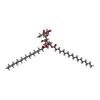
| #37: Sugar | ChemComp-DGD / |
|---|
-Non-polymers , 16 types, 550 molecules 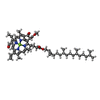
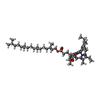
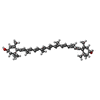
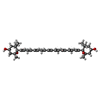
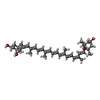
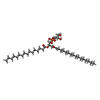
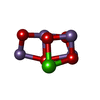



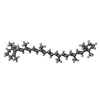
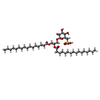
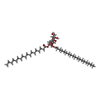
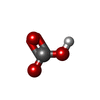
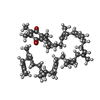
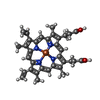















| #24: Chemical | ChemComp-CHL / #25: Chemical | ChemComp-CLA / #26: Chemical | ChemComp-LUT / ( #27: Chemical | ChemComp-XAT / ( #28: Chemical | ChemComp-NEX / ( #29: Chemical | ChemComp-LHG / #30: Chemical | #31: Chemical | #32: Chemical | #33: Chemical | ChemComp-PHO / #34: Chemical | ChemComp-BCR / #35: Chemical | ChemComp-SQD / #36: Chemical | ChemComp-LMG / #38: Chemical | #39: Chemical | |
|---|
 Movie
Movie Controller
Controller


 UCSF Chimera
UCSF Chimera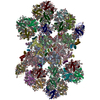

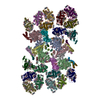

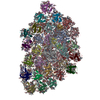
 PDBj
PDBj